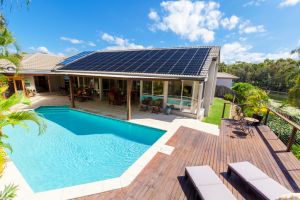In recent years, solar power has become a popular option for households looking for ways to cut their power bills. The country’s solar generation capacity grew 36% from 2014 to 2019, driven largely by residential uptake, which accounts for around 80% of NZ’s current solar-generation capacity. And it is set to expand even further, by an extra 50% by 2024, driven in part by solar panels on suburban homes.
As systems have become cheaper, uptake has increased. However, before you rush out to fit solar panels on your home, it’s important to understand that there is no one-size-fits-all approach. And solar panel alone aren’t always the solution to reducing your home’s power bills.
So, should you seek out solar? And how can you determine if the numbers stack up? Canstar explores the options.

How does household solar power work?
To work out if solar is a suitable option for your home, first it’s important to understand how solar systems work.
Solar systems convert sunlight into electricity, which can then be used to power your home. Typical systems comprise the following components:
- PV panels – convert sunlight into DC electricity. Panel efficiency depends on the type of technology used. Kilowatt (kW) is the commonly used measure of system capacity
- Inverter – converts the DC electricity produced by the panels into AC electricity for household use
- Racking – used to mount solar system panels. Typically positioned on a roof
- Import/export meter – measures both the electricity a household is using from the grid, and the excess solar-generated electricity that is fed back into the grid
Solar systems are usually grid-tied, meaning that households draw on both grid and solar electricity. Grid electricity supplements solar electricity as required. This is when usage exceeds solar capacity during the day, for example if it’s overcast, and at night when panels do not generate electricity.
Of course, systems are available in a range of kW capacities. The capacity of a system is determined by your home’s requirements.
Get a better power deal with Canstar
If you’re concerned about your power usage, consider whether you’re on the best deal for your household. Because you could be getting a better rate. Canstar rates electricity providers, so you can compare your options easily:
Canstar Blue’s latest review of NZ power companies compares them on customer satisfaction and value for money. The table below is an abridged version of our full results, available here.
^ By clicking on a brand or 'details' button, you will leave Canstar Blue and be taken to either a product provider website or a Canstar Blue NZ brand page. You agree that Canstar Blue NZ’s terms and conditions apply (without limitation) to your use of this service,to any referral to a product provider from our website, and any transaction that follows. Canstar Blue may earn a fee for referrals from its website tables, and from sponsorship (advertising) of certain products. Payment of sponsorship fees does not influence the star rating that Canstar Blue awards to a sponsored product. Fees payable by product providers for referrals and sponsorship may vary between providers, website position, and revenue model. Sponsorship fees may be higher than referral fees. Sponsored products are clearly disclosed as such on website pages. They may appear in a number of areas of the website such as in comparison tables, on hub pages and in articles. Sponsored products may be displayed in a fixed position in a table, regardless of the product’s rating, price or other attributes. The table position of a sponsored product does not indicate any ranking, rating or endorsement by Canstar Blue. See How we are funded for further details.
Canstar Blue NZ Research finalised in April 2023, published in June 2023.
See Our Ratings Methodology
Underlying economics of solar power
Many things impact the economics of solar systems. And given they are a long-term investment, it’s necessary to look to the future when calculating any possible savings on your power bills.
A study by the Sustainable Energy Association New Zealand says the key factors to consider are:
- The upfront cost – if you shop around for the best value solar systems, you’ll save more!
- Self-consumption rate – the more electricity your household uses, the bigger your potential savings
- Electricity prices – households paying more for their power saved more with solar
These are the main stats that determine how long it will take you to recover the costs of a solar system, and your long-term savings.
But you’ll also need to consider the expected lifespan of your system (approx 25 years). Along with its performance capabilities over time, the movement of electricity prices and whether your power consumption rates will hold steady.
Solar power: how much can you save?
Of course, it’s important that your property has as much direct access to sunlight as possible. No trees or tall neighbouring buildings to cast shadows. The more sunlight hours your solar panels get, the bigger your potential savings.
While solar works across the country, and still works on cloudy days, it performs best in regions with high sunshine hours. This includes Nelson and Marlborough.
Other factors influencing how much a household can save include:
The positioning and size of the system
A north-facing roof is optimal. The size of the system needs to be configured to ensure a household consumes as much as possible of the power generated.
Complimentary usage patterns
Being able to use as much as possible of the power your system generates is critical in delivering power bill savings. Will your household be able to change usage patterns to accommodate solar in both the short and long term?
Selling excess power
Do you plan to sell excess power back to the grid? If so, your system needs to be set up to accommodate this. Feed-back electricity tariff rates are generally significantly lower than regular retailer rates. So it makes more financial sense for a household to consume all the electricity they generate.
However, if you’re producing more energy than you’re using, it’s an easy way to help pay for your solar system. So it pays to shop around for the best buy-back power deal.
→ Learn more: Solar Power Plans: What Deals are Power Companies Offering?
Dedicated usage
Do you plan to harness your solar system for a specific purpose? For example, to charge an electric vehicle or to heat a swimming pool.
Interest rates
If you are borrowing to purchase a solar system, you’ll need to factor in interest rates and repayments when calculating your power savings.
Future expansion
Do you plan to expand your system at a later date, adding more panels, or incorporating battery technology? As this will impact your savings.
Additional costs
Always consider the other potential costs of solar-system ownership. These include general maintenance and the replacement of system components. Always check what is covered by warranty and for how long.

Do battery storage systems make solar more economic?
Recently, battery storage technologies have been attracting increasing attention. Batteries, such as Tesla’s Powerwall, allow households to store solar-generated energy for use when needed.
Pairing solar with storage is a great way to go green and become energy independent. However, given the significant upfront costs involved, you really need to do your sums on the long-term benefits to your pocket.
→ Learn more: Best Solar Battery Storage for Your Home
Solar power: Is it worth it?
Ultimately, whether solar is financially worth it for you, comes down to two things:
- Your ability to commit for the long haul
- Adjusting your patterns of usage so you consume as much of the power that you generate as possible, instead of buying it from a power company
Gen Less’ solar tool is a good starting point. It helps you assess the estimated financial return of solar electricity for your household. It’s also worthwhile consulting with solar experts (and shopping around) in determining whether solar is suitable for your home and pocket.
Currently, depending on the size of your solar system and your home set-up, you can expect it to pay for itself after between eight and 15 years of optimised use. However, as the costs of solar systems and batteries continue to fall, even if solar isn’t economic for you today, it could well be tomorrow.
If all this talk of electricity has left you wondering if you’re paying too much for your power, Canstar compares electricity providers in NZ. To check you’re with the best provider, just click the button below:
Compare electricity providers for free with Canstar!
About the author of this page
 This report was written by Canstar’s Editor, Bruce Pitchers. Bruce began his career writing about pop culture, and spent a decade in sports journalism. More recently, he’s applied his editing and writing skills to the world of finance and property. Prior to Canstar, he worked as a freelancer, including for The Australian Financial Review, the NZ Financial Markets Authority, and for real estate companies on both sides of the Tasman.
This report was written by Canstar’s Editor, Bruce Pitchers. Bruce began his career writing about pop culture, and spent a decade in sports journalism. More recently, he’s applied his editing and writing skills to the world of finance and property. Prior to Canstar, he worked as a freelancer, including for The Australian Financial Review, the NZ Financial Markets Authority, and for real estate companies on both sides of the Tasman.
You can like us on Facebook and get social, or sign up to receive more news like this straight to your inbox. By subscribing you agree to the Canstar Privacy PolicyEnjoy reading this article?


Share this article